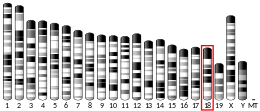BAMBI
BMP and activin membrane-bound inhibitor homolog (Xenopus laevis), also known as BAMBI, is a protein which in humans is encoded by the BAMBI gene.[5][6]
Function
This gene encodes a transmembrane glycoprotein related to the type I receptors of the transforming growth factor-beta (TGF beta) family, whose members play important roles in signal transduction in many developmental and pathological processes. The encoded protein however is a pseudoreceptor, lacking an intracellular serine/threonine kinase domain required for signaling. Similar proteins in frog, mouse and zebrafish function as negative regulators of TGF-beta, which has led to the suggestion that the encoded protein may function to limit the signaling range of the TGF-beta family during early embryogenesis.[5]
References
- ^ a b c GRCh38: Ensembl release 89: ENSG00000095739 – Ensembl, May 2017
- ^ a b c GRCm38: Ensembl release 89: ENSMUSG00000024232 – Ensembl, May 2017
- ^ "Human PubMed Reference:". National Center for Biotechnology Information, U.S. National Library of Medicine.
- ^ "Mouse PubMed Reference:". National Center for Biotechnology Information, U.S. National Library of Medicine.
- ^ a b "Entrez Gene: BMP and activin membrane-bound inhibitor homolog (Xenopus laevis)".
- ^ Degen WG, Weterman MA, van Groningen JJ, Cornelissen IM, Lemmers JP, Agterbos MA, Geurts van Kessel A, Swart GW, Bloemers HP (February 1996). "Expression of nma, a novel gene, inversely correlates with the metastatic potential of human melanoma cell lines and xenografts". Int. J. Cancer. 65 (4): 460–5. doi:10.1002/(SICI)1097-0215(19960208)65:4<460::AID-IJC12>3.0.CO;2-E. PMID 8621228.
Further reading
- Rual JF, Venkatesan K, Hao T, et al. (2005). "Towards a proteome-scale map of the human protein-protein interaction network". Nature. 437 (7062): 1173–8. Bibcode:2005Natur.437.1173R. doi:10.1038/nature04209. PMID 16189514. S2CID 4427026.
- Lin Z, Gao C, Ning Y, et al. (2008). "The pseudoreceptor BMP and activin membrane-bound inhibitor positively modulates Wnt/beta-catenin signaling". J. Biol. Chem. 283 (48): 33053–8. doi:10.1074/jbc.M804039200. PMC 2662247. PMID 18838381.
- Sekiya T, Oda T, Matsuura K, Akiyama T (2004). "Transcriptional regulation of the TGF-beta pseudoreceptor BAMBI by TGF-beta signaling". Biochem. Biophys. Res. Commun. 320 (3): 680–4. doi:10.1016/j.bbrc.2004.06.017. PMID 15240101.
- Gerhard DS, Wagner L, Feingold EA, et al. (2004). "The status, quality, and expansion of the NIH full-length cDNA project: the Mammalian Gene Collection (MGC)". Genome Res. 14 (10B): 2121–7. doi:10.1101/gr.2596504. PMC 528928. PMID 15489334.
- Fritzmann J, Morkel M, Besser D, et al. (2009). "A colorectal cancer expression profile that includes transforming growth factor beta inhibitor BAMBI predicts metastatic potential". Gastroenterology. 137 (1): 165–75. doi:10.1053/j.gastro.2009.03.041. PMID 19328798.
- Hoja MR, Wahlestedt C, Höög C (2000). "A visual intracellular classification strategy for uncharacterized human proteins". Exp. Cell Res. 259 (1): 239–46. doi:10.1006/excr.2000.4948. PMID 10942595.
- Khin SS, Kitazawa R, Win N, et al. (2009). "BAMBI gene is epigenetically silenced in subset of high-grade bladder cancer". Int. J. Cancer. 125 (2): 328–38. doi:10.1002/ijc.24318. PMID 19326429. S2CID 32084443.
- Maruyama K, Sugano S (1994). "Oligo-capping: a simple method to replace the cap structure of eukaryotic mRNAs with oligoribonucleotides". Gene. 138 (1–2): 171–4. doi:10.1016/0378-1119(94)90802-8. PMID 8125298.
- Wistow G, Bernstein SL, Wyatt MK, et al. (2002). "Expressed sequence tag analysis of human retina for the NEIBank Project: retbindin, an abundant, novel retinal cDNA and alternative splicing of other retina-preferred gene transcripts". Mol. Vis. 8: 196–204. PMID 12107411.
- Strausberg RL, Feingold EA, Grouse LH, et al. (2002). "Generation and initial analysis of more than 15,000 full-length human and mouse cDNA sequences". Proc. Natl. Acad. Sci. U.S.A. 99 (26): 16899–903. Bibcode:2002PNAS...9916899M. doi:10.1073/pnas.242603899. PMC 139241. PMID 12477932.
- Sekiya T, Adachi S, Kohu K, et al. (2004). "Identification of BMP and activin membrane-bound inhibitor (BAMBI), an inhibitor of transforming growth factor-beta signaling, as a target of the beta-catenin pathway in colorectal tumor cells". J. Biol. Chem. 279 (8): 6840–6. doi:10.1074/jbc.M310876200. PMID 14660579.
- Togo N, Ohwada S, Sakurai S, et al. (2008). "Prognostic significance of BMP and activin membrane-bound inhibitor in colorectal cancer". World J. Gastroenterol. 14 (31): 4880–8. doi:10.3748/wjg.14.4880. PMC 2739940. PMID 18756595.
- Deloukas P, Earthrowl ME, Grafham DV, et al. (2004). "The DNA sequence and comparative analysis of human chromosome 10". Nature. 429 (6990): 375–81. Bibcode:2004Natur.429..375D. doi:10.1038/nature02462. PMID 15164054.
- Zhang Z, Henzel WJ (2004). "Signal peptide prediction based on analysis of experimentally verified cleavage sites". Protein Sci. 13 (10): 2819–24. doi:10.1110/ps.04682504. PMC 2286551. PMID 15340161.
- Suzuki Y, Yoshitomo-Nakagawa K, Maruyama K, et al. (1997). "Construction and characterization of a full length-enriched and a 5'-end-enriched cDNA library". Gene. 200 (1–2): 149–56. doi:10.1016/S0378-1119(97)00411-3. PMID 9373149.
- Degen WG, Weterman MA, van Groningen JJ, et al. (1996). "Expression of nma, a novel gene, inversely correlates with the metastatic potential of human melanoma cell lines and xenografts". Int. J. Cancer. 65 (4): 460–5. doi:10.1002/(SICI)1097-0215(19960208)65:4<460::AID-IJC12>3.0.CO;2-E. PMID 8621228.
External links
- BAMBI+protein,+human at the U.S. National Library of Medicine Medical Subject Headings (MeSH)
- Human BAMBI genome location and BAMBI gene details page in the UCSC Genome Browser.
This article incorporates text from the United States National Library of Medicine, which is in the public domain.



